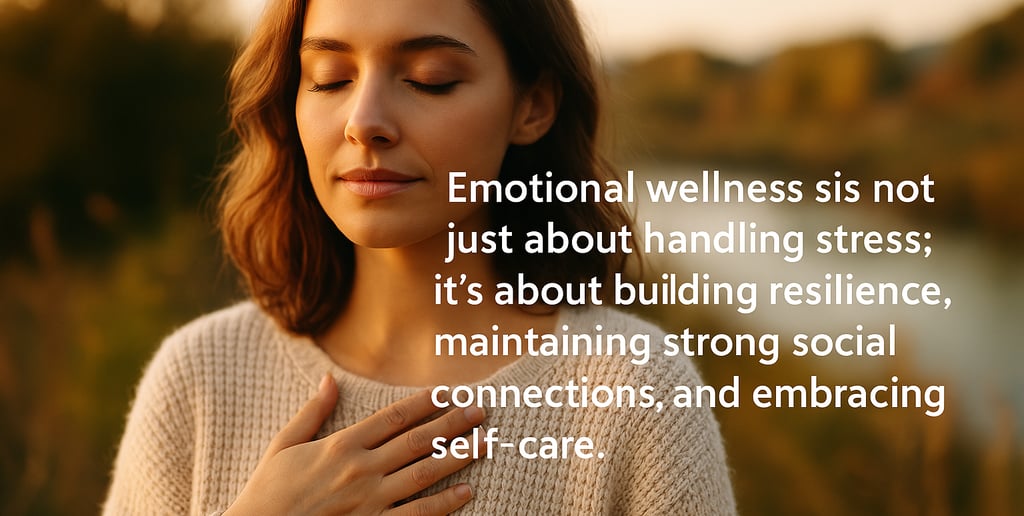Emotional Wellness Toolkit
Your Path to Resilience and Inner Balance Introduction In the whirlwind of everyday life, it's easy to feel overwhelmed. Whether it's balancing work, family, or personal goals, your emotional well-being often takes a backseat. But did you know that nurturing your emotional health can significantly impact your ability to thrive? It’s not just about handling stress—it's about building resilience, maintaining strong social connections, and embracing self-care practices that empower you. In this comprehensive guide, we explore how to develop your emotional wellness toolkit—equipping you with practical strategies to navigate life's ups and downs. Discover how to boost resilience, manage stress, and improve your overall well-being through mindful practices and healthy habits.
3/28/20252 min read


The Power of Emotional Wellness
Unlock the secrets to emotional resilience and well-being! Discover how to manage stress, strengthen social connections, and practice mindfulness in our latest blog post. Learn practical tips to build your Emotional Wellness Toolkit and navigate life's challenges with confidence.
Imagine feeling calm and collected even when challenges arise. Emotional wellness is not just about feeling good; it’s about maintaining balance when life throws curveballs. Those who master this skill can bounce back from setbacks faster and experience fewer negative emotions. This quality—resilience—is essential for a fulfilling life.
Developing emotional wellness means learning to manage stress healthily, fostering social connections, and getting quality sleep to recharge your mind and body. Sleep, often sacrificed in our busy lives, is essential for mental clarity, quick reflexes, and maintaining focus. Yet, many of us underestimate its power. Make it a priority and notice the difference.
Building Your Emotional Wellness Toolkit
Coping with Stress:
Stress is a normal part of life, but chronic stress can wear you down. Finding healthy coping mechanisms—like deep breathing, meditation, or journaling—can help you manage pressure effectively. Remember, stress can sometimes be a positive force, giving you the energy to overcome challenges. However, prolonged stress can impact both mental and physical health. Learning to balance your stress response can help boost your resilience.The Magic of Social Connections:
Have you ever noticed how a simple chat with a friend can lift your spirits? Social interactions are powerful—they can reduce stress and even lengthen your life. Whether through family bonds, friendships, or community support, maintaining strong connections is vital for emotional well-being. Make time for those who matter and build relationships that nourish your soul.Mindfulness Matters:
Mindfulness is about staying present—being fully aware of your thoughts, feelings, and surroundings without judgment. This ancient practice encourages you to slow down and appreciate the moment, rather than rushing through life on autopilot. Whether through meditation or simple breathing exercises, mindfulness can transform your emotional health.Grieving and Healing:
Losing someone you love can feel like the ground has been pulled from beneath you. Grieving is a personal journey—there’s no right or wrong way to experience it. Allow yourself to feel the pain while seeking support from friends, family, or support groups. Acknowledging your emotions is the first step toward healing.
Take Charge of Your Emotional Health
It’s easy to overlook the importance of emotional well-being when life gets busy. But taking proactive steps to nurture your mental health can make a world of difference. Use our emotional wellness toolkit to create habits that build resilience, strengthen social bonds, and promote self-awareness. Remember, prioritizing your emotional well-being is not just an act of self-care—it’s an investment in your happiness and quality of life.
Start today. Embrace resilience. Choose wellness.
Contact

82 Union Ave, New Windsor, NY 12553, USA
